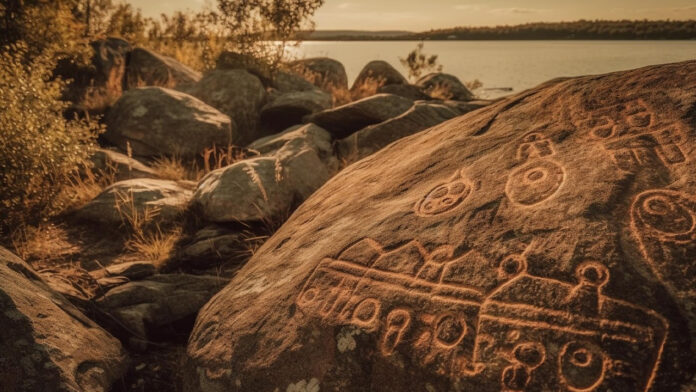The ancient world, shrouded in the mists of time, continues to captivate our imagination with its awe-inspiring achievements, enigmatic cultures, and lasting legacies. In this article, we embark on a journey through the annals of history, unraveling intriguing facts about ancient civilizations that have shaped the course of human development and left an indelible mark on our shared heritage.
Mesopotamia: Cradle of Civilization
Birth of Writing: Mesopotamia, often regarded as the cradle of civilization, witnessed the birth of writing around 3200 BCE. Cuneiform script, etched into clay tablets, laid the foundation for recorded history, literature, and administrative systems.
The Hanging Gardens of Babylon: Among the Seven Wonders of the Ancient World, the Hanging Gardens of Babylon showcased advanced irrigation systems and terraced gardens. While the gardens’ existence is debated, their legendary status persists.
Ancient Egypt: Land of Pharaohs and Pyramids
Monumental Pyramids: The Great Pyramid of Giza, built around 2580–2560 BCE, stands as a testament to ancient Egyptian engineering marvels. Its precise construction and alignment with celestial bodies continue to mystify researchers.
Hieroglyphics and Rosetta Stone: Ancient Egypt’s hieroglyphic writing system, deciphered with the help of the Rosetta Stone, revealed a wealth of knowledge about Egyptian history, religion, and daily life.
Indus Valley Civilization: Urban Sophistication
Planned Cities: The Indus Valley Civilization, one of the world’s oldest urban cultures, boasted planned cities like Mohenjo-Daro and Harappa. Advanced sanitation systems, brick-lined streets, and standardized weights showcase their urban sophistication.
Undeciphered Script: Despite its accomplishments, the Indus Valley script remains undeciphered, adding an air of mystery to this ancient civilization. The inability to read their written language leaves much about their culture in the realm of speculation.
Ancient Greece: Cradle of Democracy and Philosophy
Birth of Democracy: Ancient Greece pioneered the concept of democracy in the city-state of Athens. Citizens participated in decision-making, laying the groundwork for democratic principles that endure to this day.
Philosophical Giants: The philosophical contributions of thinkers like Socrates, Plato, and Aristotle shaped Western thought. Their inquiries into ethics, politics, and metaphysics remain foundational in philosophical discourse.
Ancient China: Great Wall and Silk Road
The Great Wall: Ancient China’s monumental achievement, the Great Wall, was constructed over centuries to protect against invasions. The wall’s length and complexity reflect the strategic prowess of Chinese engineers.
Silk Road: The Silk Road facilitated cultural exchange and trade across Asia, linking East and West. Chinese silk, spices, and innovations in papermaking and printing left an indelible impact on global commerce.
The Roman Empire: Engineering Marvels and Governance
Aqueducts and Roads: The Romans were master builders, creating aqueducts that supplied water to cities and engineering an extensive road network. Their engineering feats showcased a commitment to urban planning and infrastructure.
Pax Romana: The Pax Romana, a period of relative peace and stability, allowed for cultural flourishing and the spread of Roman influence. Roman law and governance principles continue to influence modern legal systems.
Mayan Civilization: Astronomical Marvels
Elaborate Calendars: The Maya developed intricate calendars, including the Long Count and Tzolk’in. Their precise astronomical observations allowed for accurate timekeeping and advanced agricultural planning.
Tikal and Copán: Tikal and Copán, among other Mayan city-states, featured impressive architecture and intricate carvings. The towering pyramids and ball courts stand as a testament to their cultural and architectural achievements.
Ancient Innovations and Technologies
Archimedes’ Machines: Archimedes, a Greek mathematician and inventor, created innovative machines such as the Archimedean screw for water transportation. His contributions extended to fields like mathematics, physics, and engineering.
Chinese Inventions: Ancient China gave the world transformative inventions such as gunpowder, paper, printing, and the compass. These innovations had a profound impact on technology, communication, and navigation.
Conclusion: Legacy of the Ancient World
In conclusion, the legacy of ancient civilizations echoes through the corridors of time, influencing our understanding of governance, technology, philosophy, and culture. The achievements of Mesopotamia, Egypt, Greece, China, Rome, and others have collectively shaped the course of human history, providing a rich tapestry of knowledge, innovation, and cultural diversity. As we uncover more about these ancient wonders through archaeological discoveries and scholarly research, the allure of the ancient world persists, inviting us to marvel at the enduring legacies that continue to shape our modern existence.

